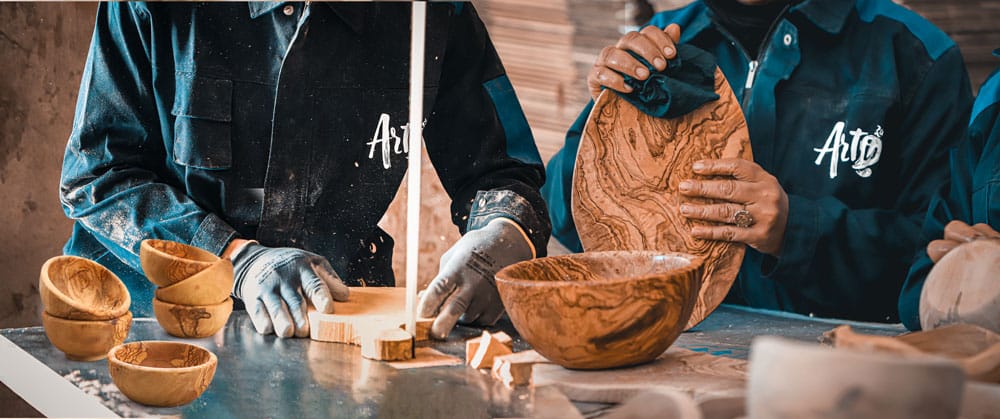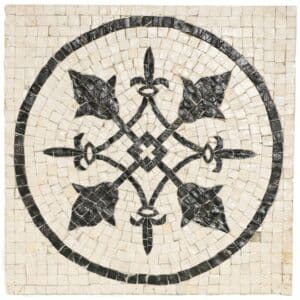
As you journey through Tunisia, the olive tree’s serene presence under the azure Mediterranean sky paints a captivating picture. The olive tree is a symbol of the nation’s history, culture, and sustainable agricultural practices. The deeply grained, durable olive wood is transformed by skilled artisans into beautiful crafts that capture the spirit of Tunisia.
The Legacy of Olive Trees in Tunisia
Tunisia, nestled in the South Mediterranean region, devotes more than 30% of its agricultural lands to olive trees. This translates to a staggering 1.68 million hectares, making Tunisia the holder of the largest olive farm globally. The essence of these olive trees is woven into Tunisia’s past, showing the impact of various civilizations on olive cultivation and how this North African nation became a pivotal player in global olive oil production.
Origin and Early History
The Phoenicians, founders of Carthage, introduced the olive tree to Tunisia from the Middle East. Each Mediterranean civilization—from the Phoenicians to the Greeks, the Carthaginians, the Romans, and the Arabs—has contributed to the evolution of olive cultivation, shaping Tunisia into a veritable “olive grove par excellence.” Tunisia’s olive groves sweep across the country, beginning in the north at the island of Cyraunis (Kerkena), coursing through Byzacène (Cap Bon), Hadrumète (Sousse), and culminating in the southern reaches around Zarzis, the island of Djerba, and the steppes of Kasserine.
The Carthaginians and the Romans
During the Carthaginian era, notably under the stewardship of the agronomist Mago, olive cultivation began to flourish, given the incentives offered to farmers for planting olive groves. The Romans expanded on this groundwork by enhancing irrigation techniques in arid lands and developing efficient oil extraction methods. Vestiges of these practices are preserved in archaeological sites like Sbeitla and El Jem, and in the Roman mosaics discovered in Sousse.
The Arabs and the Olive
Arabs from Andalusia settled in Tunisia, making the most of the ease with which they could procure farms and cultivate olive trees. Given its significance in daily life and religious rituals, olive oil became a thriving trade commodity and a source of wealth for all civilizations that have shaped Tunisia’s history.
Historical Cultivation and Modern Innovations
The history of olive cultivation traces back approximately 6000 years to Asia. The cultivated olive, olea europaea L., is believed to have descended from the wild variety, olea chysophylla laen, through the wild olive tree or oleaster. The Phoenicians propagated the olive tree to the Greek islands around the 16th century BC and later to the Greek peninsula in the 14th century BC.
In North Africa, olive cultivation has undergone several phases of transformation. The Roman period saw plantations as a factor of settlement, with remnants of farms and olive presses dispersed throughout Tunisia. The cultivation has seen continuous care and improvement, both in the handling of the tree and in the extraction of high-quality oil.
Modern Day Tunisia and Olive Cultivation
Today, Tunisia is the largest producer of olive oil outside the European Union, with around 70 million trees covering 1.7 million hectares. These trees flourish on over 80% of the land designated for fruit tree cultivation. The Chelmali variety of olive, celebrated for its richly flavored oil, is predominant in the central and southern regions of Tunisia, notably around Sfax.
Chelmali Olive Wood: A Symbol of History and Craftsmanship
At our ArtisRaw factory in Sfax, skilled artisans work their magic on the Chelmali olive wood, known for its darker, richly grained characteristics. Each creation, whether a simple kitchen utensil, an elegant piece of furniture, or a decorative item, carries a piece of Tunisia’s history, culture, and the artisan’s personal touch.
Conclusion
In Tunisia, olive trees have stood the test of time, flourishing amidst aridity and desert soils. The Tunisian olive grove forms a significant part of the country’s identity and economy, showcasing the timeless value of the olive tree. When you purchase our Chelmali olive wood crafts, you’re not only acquiring a product of superior quality and unique beauty but also a tangible piece of this enduring and beautiful agricultural heritage. Embrace a piece of Tunisia’s vibrant olive culture and support sustainable farming with our unique Chelmali olive wood crafts.






